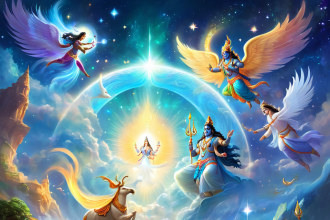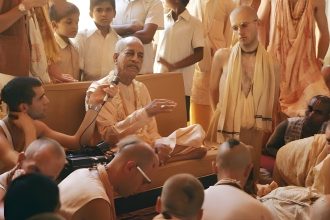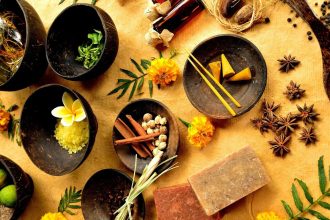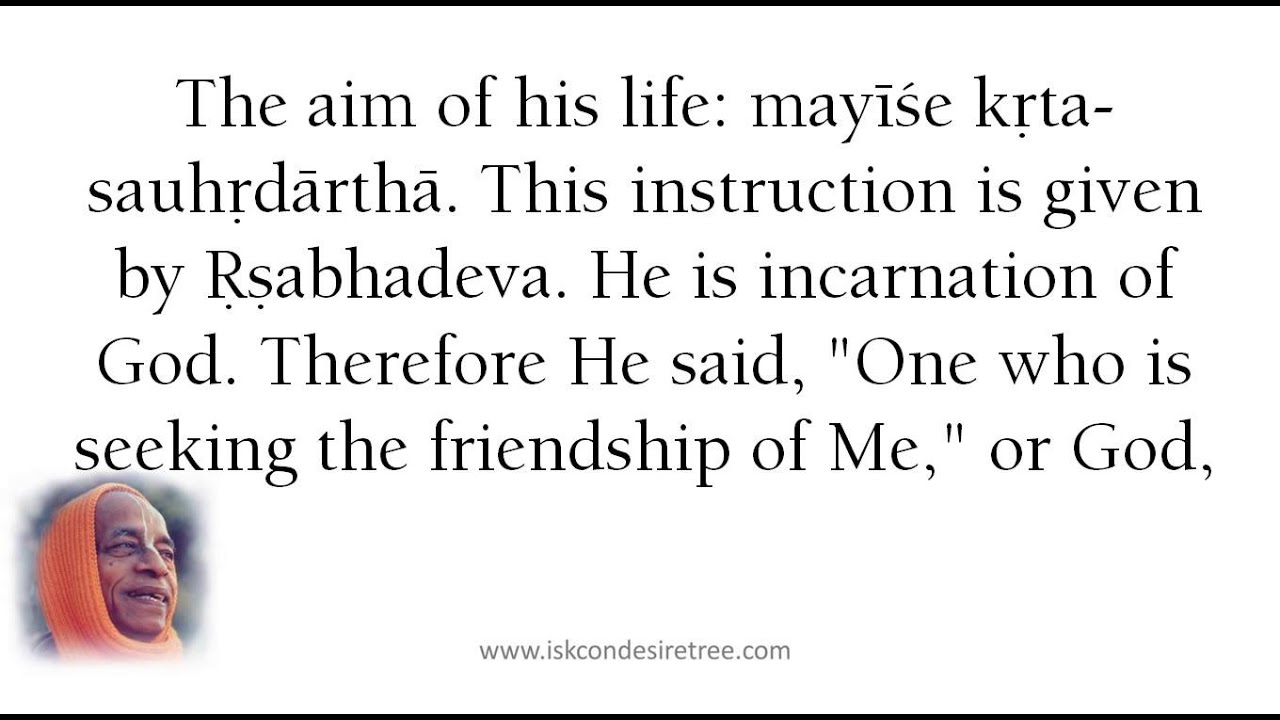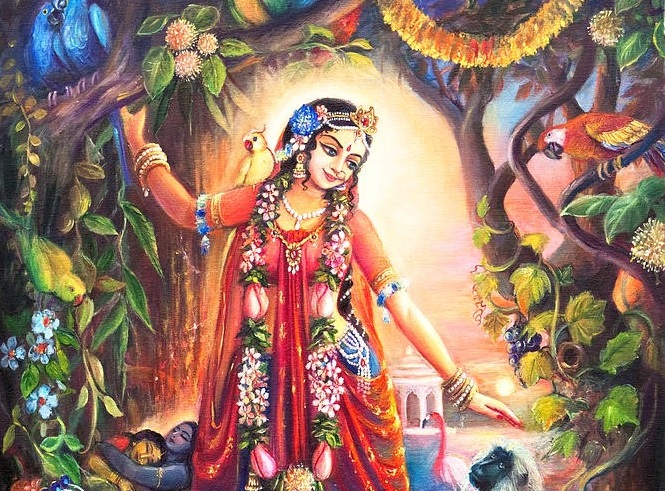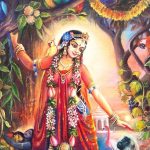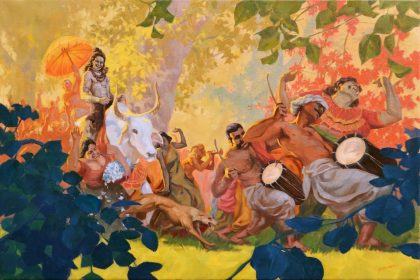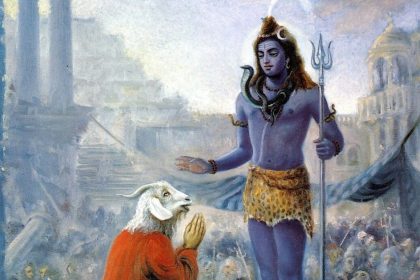When the demon arrived there, he saw Lord Śiva sitting in a yogic meditation posture at the root of a fig tree. Looking as bright as a million suns, Lord Śiva was smiling. He appeared as though the Infinite Light were radiating from every pore of his body. He was wearing a tiger skin and holding a trident and an ax, and his head was covered with bright bunches of matted hair. He had five faces and three eyes in each, and there were sacred snakes coiled around his neck. He was the death of death, the destroyer of the world and a powerful lord. His face was serene and beautiful. He immortalizes his devotees, awards the fruits of asceticism and is a source of prosperity. He destroys the world and rescues sinners from hell.
Upon seeing Lord Śiva, Śaṅkhacūḍa got down from his chariot and, with his entire army, bowed low to him. He also saluted Bhadrakālī, who was on Lord Śiva’s left side, and Kārttikeya, who was in the front. In response, they bestowed blessings on him. Nandī and other devotees of Lord Śiva got up and greeted him in a suitable manner. Śaṅkhacūḍa spoke cordially to them and then sat down beside Lord Śiva, who greeted him cheerfully and said, “O King, Lord Brahmā, the creator of the world and the father of religious duty, had a Vaiṣṇava son named Marīci, who begat the virtuous Kaśyapa. Dakṣa, another son of Lord Brahmā, bowed to Kaśyapa and gave him his thirteen daughters in marriage. Of these daughters, Danu, who was very blessed and chaste, gave birth to forty sons. They were all very spirited and known as Dānavas. Amongst them, Vipracitti was prominent-he was most valorous, pious and devoted to Lord Viṣṇu. His son’s name was Dambha and he obtained Śukrācārya as his guru. Following his teacher’s advice, he worshiped Lord Kṛṣṇa at Puṣkara by reciting the Kṛṣṇa-mantra for one hundred thousand years. Consequently, by Lord Kṛṣṇa’s boon, he was able to get a son like you.
“In your former birth, in Goloka, you were very religious and were the chief cowherd friend of Lord Kṛṣṇa. By Rādhā’s curse, you have become lord of the demons here. But you are also a Vaiṣṇava. And a Vaiṣṇava regards everything-from the form of Lord Brahmā down to the form of a blade of grass-as very illusory. Even if the four kinds of liberation are offered to him, namely, sālokya, sārṣṭi, sāyujya and sāmīpya (to live on the same planet as Lord Viṣṇu, to have the same opulences as Lord Viṣṇu, to merge with Lord Viṣṇu and to have equal association with Lord Viṣṇu, respectively), he does not care at all for them; for he is only interested in serving Lord Viṣṇu. Nor does he care to have the position of Indra, Kuvera or Brahmā, for he thinks them all insignificant. He only cares to worship and serve Lord Kṛṣṇa. Now you are a true Kṛṣṇa devotee. Therefore, why do you care for things that belong to the demigods and which are false to you? Better return to the demigods their kingdoms and please me by this act. Let the demigods be reinstated in their own positions and you govern your own kingdom happily. You are all descendants of Kaśyapa Muni. So it is not desirable for relatives to feud. In fact, the sin committed by killing a brāhmaṇa is not even one sixteenth as great as that of creating hostilities amongst one’s relatives.
“O King, pause. If you think that by restoring to the demigods their kingdoms, you will lose prestige, you should also consider that no one’s position is stable or unchanging. When the world is completely dissolved, even Lord Brahmā disappears; then, by the will of God, he subsequently reappears. And later, by virtue of his knowledge, he again creates everything. But the type of knowledge, intellect and memory that people receive depends on the amount of austerity they practiced in their previous births.
“Also, consider this: truth is the support of dharma or virtue. In the Satya-yuga (golden or truthful age), virtue is complete; in the Treta-yuga (silver age), it is reduced by one fourth; in the Dvāpara-yuga (copper age) by one half; and in the Kali-yuga (iron age or age of quarrel), by three fourths; and at the end of the Kali-yuga, virtue becomes reduced even more, like the moon on the dark-moon night.
“Or consider the sun: in the summer its light is very intense; but not so in the winter. At noon, the sun is very hot; but not so in the morning and evening. In time, the sun rises; in time, it becomes powerful; and in time, it sets. By the working of time, it is obscured by clouds.
“Then consider the moon: when the moon is devoured by Rāhu (as in a lunar eclipse), it trembles; when it is released, it becomes bright again. In the full-moon night, it becomes full, but does not remain so. In the bright fortnight, it waxes daily, but in the dark fortnight, it wanes daily. In the bright fortnight, the moon looks healthy and rich, but in the dark fortnight, it looks decreasingly thinner, as if afflicted by consumption. Thus, at one time the moon looks powerful, and at another time it looks weak and pale.
“Similarly, Bali Mahārāja is presently living in Pātālaloka (one of the planets beneath the earth), but at another time he will become lord of the demigods. At one time the earth is lush with grains and is the resting place of all beings, but at another time it becomes covered with water. The entire world, including everything moving and nonmoving, appears at one time and disappears at another.
“Only Lord Kṛṣṇa, the Supreme Personality of Godhead, remains the same. It is by His grace that I obtained the name Mṛtyuñjaya (the Conquerer of Death). I have witnessed many dissolutions of the world and I shall continue to witness them. Lord Kṛṣṇa is both material nature and the Supreme Being. He is the individual soul as well as the Supreme Soul. Though He assumes many forms, He is beyond these forms. Whoever repeats His name and sings His glories can conquer death; he does not come under the influence of birth, death, disease, old age and fear. Lord Kṛṣṇa has created Brahmā, the creator; Viṣṇu, the preserver; and me, the destroyer. By His will we possess those potencies and influences. O King! I have delegated Kāla, Agni and Rudra to do the work of destruction, whereas I myself only repeat His name and sing His glories incessantly, day and night. For this reason I am called Mṛtyuñjaya, and by my knowledge, I have conquered death. I am fearless. When death sees me, he flies away, just as snakes flee when they see Garuḍa.”
King Śaṅkhacūḍa thanked and praised Lord Śiva repeatedly, and replied modestly. “What you have said is quite true. But please allow me to say a few words. Kindly listen…You have just said that fighting with one’s relatives is a great sin. Then why did the Lord, on behalf of the demigods, take away all of Bali Mahārāja’s possessions and send him down to Pātāla? And why did the Lord, for the same reason, kill Hiraṇyākṣa, Hiraṇyakaśipu, Śumbha and other Dānavas (demons)? Long ago the demons and the demigods worked hard together churning the ocean to obtain nectar from it; but why did the Lord give the nectar to the demigods? O lord, this universe is the sporting ground of Lord Kṛṣṇa; and anyone He favors with fortune and glory obtains them. The quarreling between the demigods and the demons is eternal. Victory and defeat come to each party alternately. So it is improper and unnecessary for you to interfere in our quarrel. For you, O great lord, are both my relative and my friend. And your nature is of the Highest Self. To you, the demigods and the demons are equal. So it is certainly shameful for you to become our opponent and favor the demigods. If you win this battle, the glory and fame you gain would not be as great as if we win. And if we defeat you, the disgrace and infamy you earn would be much greater than that which we would if we were defeated: for we are small and you are great.
Lord Śiva smiled and gently said, “O King, you have descended from a brāhmaṇa family, so if I am defeated by you, how shall I incur shame? In former days, the Lord fought with Madhu and Kaiṭabha as well as Hiraṇyakaśipu and Hiraṇyākṣa. And I fought with Tripura. And the universal mother, Durgā Devī, fought with Śumbha and other demons. But none of the demons just mentioned, who were killed in the war, can be compared to you in prowess. You are the best of Lord Kṛṣṇa’s attendants. The demigods have sought Lord Hari’s protection, so He has sent me on their behalf to approach you. If I am defeated by a sublime person like yourself, how can I be disgraced? But I am surprised to hear you talk of disgrace and infamy. There is no point in continuing this useless talk. Now, either return to the demigods their kingdoms or prepare to fight with me. I am firm in my determination.”


